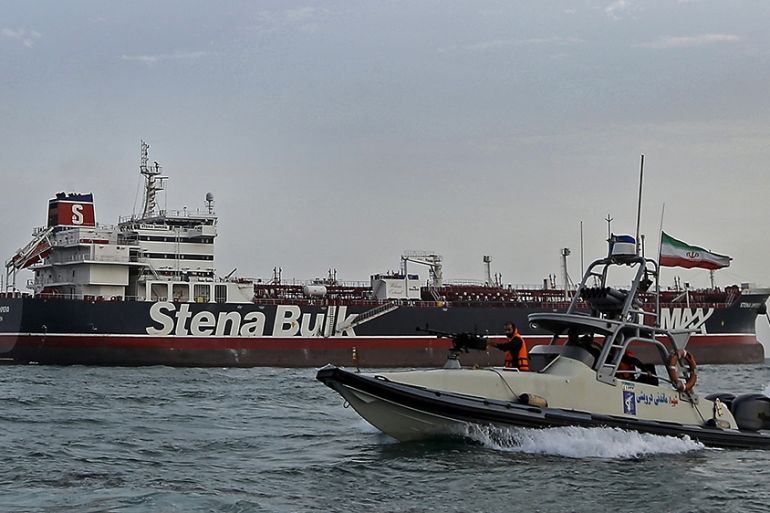UK tells Iran to release seized oil tanker and crew immediately
British prime minister chairs emergency meeting to decide on how to respond after Iran seized its oil tanker.

The United Kingdom has called on Iran to release a British-flagged tanker and its crew immediately, describing the seizure of the Stena Impero oil tanker by the Iranian forces as illegal.
The Islamic Revolutionary Guard Corps (IRGC) commandos rappelled from helicopters and seized the tanker in the Strait of Hormuz on Friday in apparent retaliation for the British capture of an Iranian tanker two weeks earlier.
Keep reading
list of 4 itemsHong Kong’s first monkey virus case – what do we know about the B virus?
Why will low birthrate in Europe trigger ‘Staggering social change’?
The Max Planck Society must end its unconditional support for Israel
“The ship was seized under false and illegal pretences and the Iranians should release it and its crew immediately,” British Prime Minister Theresa May‘s spokesman told reporters on Monday.
“We do not seek confrontation with Iran but it is unacceptable and highly escalatory to seize a ship going about legitimate business through internationally recognised shipping lanes.”
May was chairing a meeting of the UK’s COBR emergency response committee on Monday to discuss the Gulf crisis.
Footage obtained by Reuters news agency from an Iranian news agency on Sunday showed the British tanker docked in an Iranian port – with Iran‘s flag hoisted atop.
The British government is expected to announce its next steps in parliament on Monday.
But experts on the region say there are few obvious steps London can take at a time when the United States has already imposed the maximum possible economic sanctions, banning all Iranian oil exports worldwide.
Al Jazeera’s Laurence Lee, reporting from London, said the British government was in “a very difficult position”.
“They don’t want to back what the Americans want, which is to take part in this multination coalition of warships [in the Strait]. But they don’t have enough warships of their own to protect their oil tankers there either,” he said.
Few options
“We rant and rave and we shout at the ambassador and we hope it all goes away,” said Tim Ripley, a British defence expert who writes about the Gulf for Jane’s Defence Weekly.
“I don’t see at this point in time us being able to offer a concession that can resolve the crisis. Providing security and escort for future ships is a different matter.”
A day after calling the Iranian action a “hostile act”, top British officials remained comparatively quiet on Sunday, making clear that they had yet to settle on a response.
“We are going to be looking at a series of options,” Tobias Ellwood, junior defence minister, told the broadcaster Sky News.
“We will be speaking with our colleagues, our international allies, to see what can actually be done,” he added.
“Our first and most important responsibility is to make sure we get a solution to the issue to do with the current ship, make sure other British-flagged ships are safe to operate in these waters and then look at the wider picture.”

The Iranian capture of the ship in the global oil trade’s most important waterway was the latest escalation in three months of spiralling confrontation with the West that began when new, tighter US sanctions took effect at the start of May.
Washington imposed the sanctions after President Donald Trump pulled out of a deal signed by his predecessor Barack Obama, which had provided Iran access to world trade in return for curbs on its nuclear programme.
|
|
European countries including Britain have been caught in the middle.
They disagreed with the US decision to quit the nuclear deal but have so far failed to offer Iran another way to receive the deal’s promised economic benefits.
Britain was thrust more directly into the confrontation on July 4, when its Royal Marines seized an Iranian tanker off the coast of Gibraltar.
Britain accused it of violating sanctions on Syria, prompting repeated Iranian threats of retaliation.
While Iran’s official line is that its capture of the Stena Impero was because of safety issues, it has done little to hide that the move was retaliatory.
The tactics it used – with masked troops rappelling from helicopters – matched that of the UK, used two weeks before.
Parliament Speaker Ali Larijani spelled it out more clearly on Sunday, telling a parliament session: “The Revolutionary Guards responded to Britain’s hijacking of the Iranian tanker.”
Iran’s Foreign Minister, Mohammad Javad Zarif, blamed Washington and Trump’s hawkish NSA John Bolton for luring Britain into conflict.
“Having failed to lure @realDonaldTrump into War of the Century … @AmbJohnBolton is turning his venom against the UK in hopes of dragging it into a quagmire,” Zarif wrote on Twitter. “Only prudence and foresight can thwart such ploys.”
Chance of war
Stephen Zunes, a professor of politics at the University of San Francisco, told Al Jazeera that the escalations increase the chances of a conflict even if neither side wants a war.
“With the increasing military threats from the US, this is perhaps the Iranian government’s way of saying to the European community: ‘Hey folks, this is serious. You need to help us out here or things could get really bad’,” Zunes said.
“I do not think either the US or Iran actually want to have a war. But this kind of mutual provocation, upping the stakes can create a situation where some kind of misunderstanding or accident will rapidly escalate, so it’s a very very high stakes game,” he said.